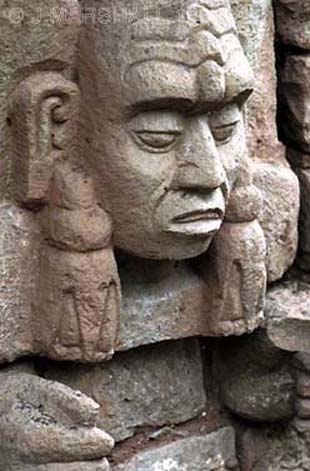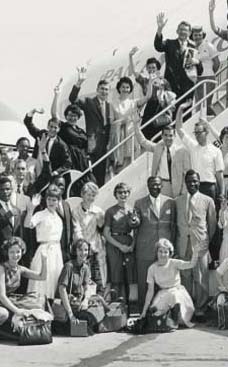
I was twenty four when I moved to Honduras to serve as a Peace Corps Volunteer. For two years I lived with a Honduran family and worked in a Honduran school. It was a marvelous time period in my life. I was young and energetic, and I loved taking part in all things Honduran. I danced at Carnival and helped out at local celebrations. And I started to see that Honduran people weren't so very different from Americans. Maybe they weren't so exotic after all. I turned thirty while cycling Pakistan and India. Now this – this WAS exotic. Everything was different and exciting. They dressed differently, they ate different food, they worshipped a different god. Their written script was different from English, and they wore jewelry in places I'd never dreamed of. It was colorful and outlandish and glamorous and… exotic. Very exotic. Since then I've spent many years gallivanting around the world. I've been to Timbuktu and back. I lived a couple years in Egypt; a bunch of years in Ethiopia. Taiwan… Malaysia… Living in other countries was exciting and interesting. It was different from living in the USA. When I walked out my gate, I saw people with another color of skin wearing beautiful hand-spun and embroidered clothing. I smelled the sour aroma of injera or the spices of wat. I learned to drink coffee at Ethiopian coffee ceremonies, and drank mate in Argentina. It was a wild thirty years. It was a blast and I learned a lot. But the most important thing I learned is that we are more alike than we are different.
Honduras RPCV Nancy Sathre-Vogel writes: I've taken a long time to go nowhere. Thirty seven years and hundreds of thousands of miles, in fact – and I'm right back where I started
Exotic is our own backyard
Sunday, May 15, 2011 -
Family on Bikes by Nancy Sathre-Vogel
BOISE, Id, May 15, 2011 - I've taken a long time to go nowhere. Thirty seven years and hundreds of thousands of miles, in fact – and I'm right back where I started.
Thirty seven years ago, I was a sixteen-year-old who knew nothing. And everything. I lived my life in Boise, Idaho, just like all the other kids in my high school lived theirs and, I thought, just like every other sixteen-year-old in the world lived.
Every morning I took a hot shower, put on clean clothes, and took the school bus to my local high school. While there I learned about "the world" – I only saw pictures of Indonesian tribes and African clans. They all wore fabulous costumes (or no costumes at all) and ate outrageous food, and it was all pretty interesting – as interesting as could be for something that happened a hundred years ago.
Burmese parents have the same hopes and aspirations for their children as American parents - we want them to be healthy and happy
Because, of course, nobody lived that way today. Everybody lived like I did in Boise, Idaho. They were all just like me.
That year my parents took me to Mexico for Christmas vacation and my eyes were opened to a wide, wide world out there. I remember walking the streets of Mexico City in wide-eyed amazement. Life was different than in Boise! People lived differently than I did! I was amazed.
It was there on the streets of Mexico City that I realized people were different than I was. Exotic, to be sure.
One of my most vivid memories of that trip to Mexico was the flame thrower. I watched that flame thrower as he took a big swig of kerosene into his mouth, then blew it out while lighting it on fire. Flames shot out six feet or more! Now this – this was exciting. This was different. It was…exotic.
It was different and unusual and out of the ordinary. It was foreign and alien and mysterious. It was the very definition of exotic.
I was twenty four when I moved to Honduras to serve as a Peace Corps Volunteer. For two years I lived with a Honduran family and worked in a Honduran school. It was a marvelous time period in my life. I was young and energetic, and I loved taking part in all things Honduran.
I danced at Carnival and helped out at local celebrations.
And I started to see that Honduran people weren't so very different from Americans. Maybe they weren't so exotic after all.
I turned thirty while cycling Pakistan and India. Now this – this WAS exotic. Everything was different and exciting. They dressed differently, they ate different food, they worshipped a different god. Their written script was different from English, and they wore jewelry in places I'd never dreamed of.
It was colorful and outlandish and glamorous and… exotic. Very exotic.
Since then I've spent many years gallivanting around the world. I've been to Timbuktu and back. I lived a couple years in Egypt; a bunch of years in Ethiopia. Taiwan… Malaysia… Living in other countries was exciting and interesting. It was different from living in the USA.
When I walked out my gate, I saw people with another color of skin wearing beautiful hand-spun and embroidered clothing. I smelled the sour aroma of injera or the spices of wat. I learned to drink coffee at Ethiopian coffee ceremonies, and drank mate in Argentina.
It was a wild thirty years. It was a blast and I learned a lot.
But the most important thing I learned is that we are more alike than we are different.
It was when I was trekking high up in the Himalayas that I realized that, although our houses may look different from one another, we make them the way we do simply because of the local materials available to us. Whereas, here in the USA, we build our houses with wood, in the Himalayas, houses are built with stones. High up above the tree line, the only thing they have available is an endless supply of rocks – so they use them to build their houses.
In Ethiopia, they use mud for the walls and thatch for the roofs – because that's what they have.
I also realized we all eat what we eat because that's what's grown around us. Our traditional foods are based on what grows locally. Where bananas grow freely you'll find banana everything – fried banana, banana soup, banana fritters. In Patagonia, known for its massive sheep ranches, you'll find lamb meat everywhere you look.
In Ethiopia, teff is the primary grain grown, so that's what they use to make their bread. In Idaho, we eat potatoes.
You see – all around the world we carve out our life based upon what's around us. If we live in the tropics we don't bother sealing our houses – we want the cool breeze to pass through. If we live where winter comes, our houses need to protect us from the cold. One isn't better or worse, just different. And yet, the same.
Every parent in the world only wants the best for her child. We all want our children to have more than we have – and I'm not referring to "stuff" here. We want our children to be healthy and happy. We want them to be successful – although we may have different definitions of what success is.
Every single human being on our planet has only three basic needs – food, water, and a place to sleep. We all understand that – regardless of what kind of wrapper we come in. It doesn't matter what language we speak or what god we worship. The currency we spend is irrelevant, as is how much of that currency we have to spend. Skin color, style of clothing, how big of a house we live in. None of that really matters – because we are all the same.
After years of globetrotting, I've come to the realization that people everywhere are the same – just like I thought when I was sixteen. I've come back to where I used to be. I've come home.
And you know what? Boise IS exotic! Boise is just as exotic as Addis Ababa, Ethiopia or Alexandria, Egypt. It's no better or worse than Kaohsiung, Taiwan or La Paz, Bolivia. Every single one of us in Boise is doing the same thing as those living in Tegucigalpa, Honduras or Timbuku – we're just living. We're eating, We're drinking. We're sleeping. Just like people everywhere.
We, here in Boise Idaho, are just as exotic as them. Not better. Not worse. Just different. And yet the same.
Nancy Sathre-Vogel is a long-time teacher who recently cycled from Alaska to Argentina with her husband and twin sons. She documented their journey for Guinness World Records at www.familyonbikes.org and also writes for Examiner.com about roadschooling, international travel and bike touring throughout the world. Follow her on Twitter and Facebook














